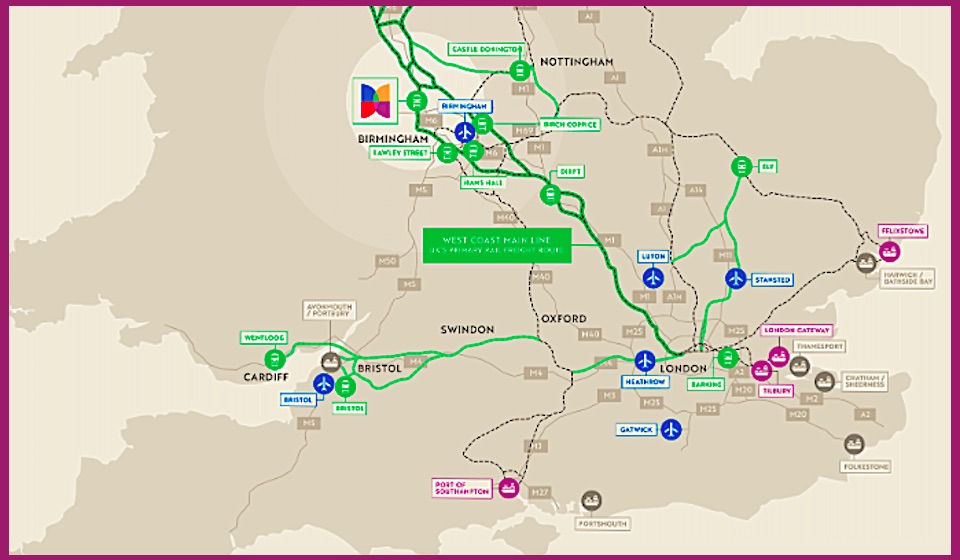Rails imminent as West Midlands Interchange construction begins

Construction has begun at West Midlands Interchange. Oxford Properties Group, a multi-national real estate investor, in collaboration with Logistics Capital Partners (LCP), a logistics developer and asset manager across Europe, have embarked on the task of making real the promise of the West Midlands Interchange (WMI). It has been touted as the United Kingdom’s largest logistics development. Its attraction has been underscored by the commitment that rail freight will play an indispensable role in multimodal operations at the site.
It will generate a whole new raft of intermodal movements across the UK. The ambitious West Midlands Interchange is a joint venture between Oxford and LCP. The project began with the acquisition of the 734-acre (300-hectare) site back in 2021, and its first construction phase is already underway, with, among the more usual rail and road infrastructure, the creation of two new country parks. Warehousing will follow, with footprints up to almost 100,000 square meters. The project represents an investment of over one billion pounds (1,16 billion euros).
Eco-friendly attributes of rail transport
The site lies just south of Stafford and adjacent to the UK motorway network, giving the project plenty of potential. The promoters claim it will invigorate the regional economy and provide around 8,500 jobs. All that, it’s claimed, will add nearly one billion pounds (1,16 billion euros) annually to the national economy. That makes those intermodal trains – if not quite worth their weight in gold – certainly valuable commodities in their own right. However, the developers do emphasise that the terminal is within a four-hour drive of 88 per cent of the UK population – a stat that may well be challenged by the rail freight community.
What may drive the green credentials of the West Midlands Interchange may come from the eventual tenants who occupy the huge warehouse farm. The market is acutely aware of aligning their operational needs with environmental ones. The UK logistics industry is on its own decarbonisation journey, capitalising on the eco-friendly attributes of rail transport. The West Midlands Interchange could potentially eliminate 77 heavy goods vehicles (HGVs) from the road with each freight train, ultimately aiming to cut 50 million kilometres of HGV traffic annually.
Milestone example for private investment
“Demand for best-in-class logistics space that’s sustainable and well connected continues to significantly outstrip supply, especially in the UK’s Golden Triangle”, said James Boadle, Head of Logistics and European Strategy at Oxford Properties, referring to the concentration of inland distribution centres growing around the region. “With spades now in the ground, we are at the first step in the construction of this major project that we are undertaking alongside LCP.”
“We are delivering what will be a world-leading logistics hub, with a new Strategic Rail Freight Interchange”, said James Markby, LCP Managing Partner. “[The project is] delivering significant economic benefit to the region and nationally, and creating a milestone example for private investment that materially contributes towards a carbon net-zero future.”
Implications of HS2 cancellation
However, just as the project begins to take shape, there are concerns about the cancellation of the HS2 high-speed railway project north of Birmingham, and its potential impact on the future capacity of rail freight operations. The West Midlands Interchange, along with other rail freight terminals under construction in the Golden Triangle could face challenges in realising their full potential without the support of HS2. The new line was initially intended to enhance the UK’s rail infrastructure and create a more robust and efficient network for freight transport, particularly on the already very busy West Coast Main Line.

Construction firm, Winvic have been appointed on the first phase of the construction. Their Director of Civils and Infrastructure, Rob Cook, was confident they are prepared for the job in hand. “Our team is experienced in delivering similar sustainable rail served logistics parks and in working collaboratively to give local people access to construction skills and employment”, he said. Winvic has extensive experience in the field, and is actively involved in several other rail freight terminal projects, including the complex project at Northampton, and the recent commissioning of the second phase of East Midlands Gateway. It might not be HS2, but at least something is being built north of Birmingham.




